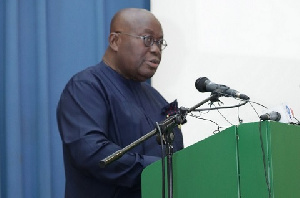In August 2005, three urologists of the Korle-Bu Teaching Hospital in Accra died in a motor accident. The deceased were Emeritus Prof J.K.M. Quartey, Dr. Isaac Kofi Bentsil and Dr Benjamin Kofi Osei Wiafe. The HORRIFIC accident happened on the Bunso-Apedwa road.
[Then] President J A Kufuor spoke for everyone when he said: “I am so shocked by the fact that we have lost three of our specialists. It is an irreparable loss to the nation”.
Irreparable indeed – for good urologists are among the rarest specialists in the medical field.
Many people hoped that after the words of the President, the authorities would ally round to make that stretch of road safety. They did not.
No other motor accident has touched the nation's soul as much as the one that has claimed the life of the popular singing star, Ebony Reigns.
Reflecting this concern, our current President, Nana Addo Dankwa Akufo-Addo has charged no less than three Ministers with the duty of developing proposals that will enhance road safety in the country.
But knowing Ghana's public service, I am a bit sceptical about the outcome of the exercise the President has set in motion. There will, initially, be a lot of noise in the media about what the Ministerial Committee is going to be doing.
Then, after three months or so, there will be the usual Ghanaian “silence of the tomb” over its activities. A “Ministerial Committee” is“looking to it!” (as the dear, recently-departed ace comedian, “Super OD” of Osofo Dadzie fame) would have put it. And that would be that.
Well, I serve to notice that I shall expose any such silence. Meanwhile, I shall attempt to help the Ministerial Committee to put itself on on a good footing.
First of all, the Committee should not make the fatal mistake of handing the job over to the “experts” in their Ministries.
Oh, they should listen to the experts all right. But they should make their own decisions. For if they (the experts) could have used their knowledge and experience to prevent a situation arising that would cause our President so much heart-ache, they would have solved the problems that cause these unnecessary road accidents.
So, the Ministerial Committee should think out of the box! It should set up an ad hoc committee and ask it to identify the major causes of accidents in the country and how to eliminate them. The ad hoc committee should include, in its membership, a road engineer currently teaching at a University with a scientific bias; retired road engineers (one formerly employed by the PWD and the other by the GNCC); a member of the road transport union; a person from the budgetary division of the Ministry of Finance; a retired member of the Ghana Police Service Motor Traffic Unit; and an ex-transport operator.
This list is not conclusive, but it gives an idea of what I have in mind. In Ghana, it is not wise to assume that the qualifications and experience of experts will necessarily make them deliver results requisite with their know-how.
Some usually harbour undisclosed conflicts of interest. So, the less involved they are in current business activity related to their calling, the more likely they are to offer disinterested opinions. Even so, the people put on the ad hoc committee should largely remain anonymous, to avoid being lobbied by interested parties.
The ad hoc committee should immediately draw up a list of 10-20 of the most frequently used major roads, which its members would inspect with a fine tooth's comb, to map out dangerous corners; hills and hillocks that constitute a dangerous hazard to motorists overtaking others; bad surfaces that divert drivers away from their given paths; areas where over-speeding is likely to occur; and obstacles like gravel piled up on the roads and not adequately sign-posted, if signposted at all.
They should ask for funds that will enable every dangerous hazard to be VIVIDLY SIGNPOSTED. They should then charge the Ghana Police Service with the duty of constantly monitoring the observance, or otherwise, of these road signs, by drivers.
The monitoring team should also detect broken-down vehicles and get them TOWED AWAY URGENTLY. Where that's impossible, HUGE 'DANGER' SIGNS SHOULD BE UNFAILINGLY PLACED near the breakdowns.
Now, members of the Ghana Police Service are wonderful at emerging suddenly out of hiding places to detect vehicles which do not possess valid “quarter licences” or insurance certificates. Could they kindly extend this monitoring to actions that can actually save lives? To enhance police monitoring, couldn't transport union members be included in their monitoring/patrol teams, on a revolving basis (so that they too do not get corrupted)?
Finally, the ad hoc committee should look into the feasibility of establishing, at vantage points on the highways, Road Safety posts, manned by para-medics equipped with mobile phones (and motorbikes and/or cars) who can offer first aid to passengers injured in accidents, and at the same time alert hospitals and clinics to dispatch ambulances to accident spots to pick up the more serious cases. A mere tourniquet expertly placed on a bleeding body can save a life.
The Police should also be provided with regular assistance by a well-endowed Helicopter arm of the Ghana Air Force, for medi-vac operations (as is done in some countries).
M'anses?m a metooe yi, s? ?y? d? oo, s? ?nny? d? ooo, ebi nk? na ebi mmera! (“This my tale which I have narrated to you, be it sweet/good, or be it bitter/ bad, let some [wisdom] go forth from it, and let some come back [to me]!”)
So, to your pens, readers! Please react!

